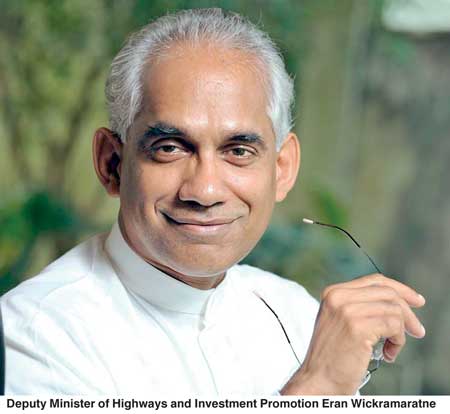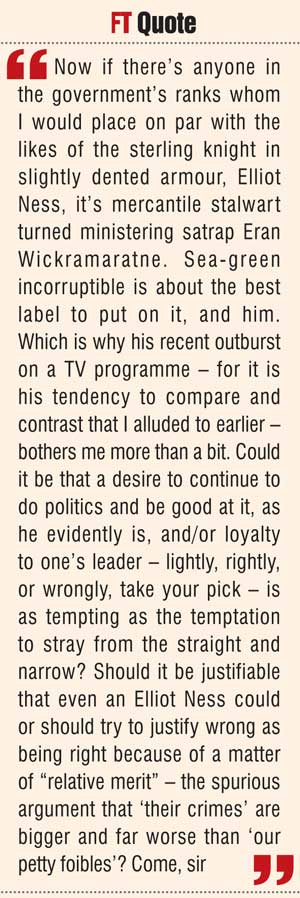Monday Feb 16, 2026
Monday Feb 16, 2026
Friday, 15 May 2015 00:05 - - {{hitsCtrl.values.hits}}
Today, Jinny and Jonny. Yesterday, Tissa and Sashi and Basil. Who will it be tomorrow, GR and/or MR? That is as far as actual arrests go! There has also been a veritable gallery of alleged rogues hauled in to give account before the dreaded FCID vis-à-vis alleged financial wrongdoing. Which list has been – so far at least – limited to stalwarts of the previous regime. While key players in the present administration who are also under comparable clouds appear to be able to avoid the attention of the fiscal and fiduciary sleuths. Or get off with the lightest rap on their knuckles a.k.a. compulsory leave while being cleared by a committee close to home. Or worse, not coming under the microscope at all!
Of course, defenders of the gover nment have been quick to point out that in comparison with the previous government’s track record of investigating and indicting wrongdoers, the incumbent administration’s attitudes and actions and achievements are commendable. Of course, critics of the government have been equally quick to point out that there is a remarkable comparison between this republican administration’s tendency to defend its own and that autocratic regime’s penchant to do the same. Of course, members of the government currently under fire for comparing and contrasting this government’s mistakes as “relatively minor” to that government’s misdeeds and misdemeanours as “reprehensibly major” don’t do themselves any favours by invoking the “relative merits” game... for comparisons are odious, and are more suitable for one-upmanship than good governance.
nment have been quick to point out that in comparison with the previous government’s track record of investigating and indicting wrongdoers, the incumbent administration’s attitudes and actions and achievements are commendable. Of course, critics of the government have been equally quick to point out that there is a remarkable comparison between this republican administration’s tendency to defend its own and that autocratic regime’s penchant to do the same. Of course, members of the government currently under fire for comparing and contrasting this government’s mistakes as “relatively minor” to that government’s misdeeds and misdemeanours as “reprehensibly major” don’t do themselves any favours by invoking the “relative merits” game... for comparisons are odious, and are more suitable for one-upmanship than good governance.
So there is little – if any – merit in the defence of one government minister that there is hardly any comparison between the present Central Bank fiasco and all the flops, flubs, failures, of the erstwhile Central Bank imbroglios. There is even less merit in the tone of that government minister’s arguments, much less the tenor of his ‘aggro’ and the timbre of his avoidance on a Satana TV interview recently. Really, we are quite disappointed at the rapidity with which yesterday’s incorruptible democrats descend into becoming today’s infuriated demagogues. Truly, it was said that power tends to corrupt, and that great men are not always good men, nor that their offices sanctify the holders of them. Surely, there must be some explanation of how quickly the mask has slipped off the suave, smiling, serious, sincere face of ‘good governance’?
much less the tenor of his ‘aggro’ and the timbre of his avoidance on a Satana TV interview recently. Really, we are quite disappointed at the rapidity with which yesterday’s incorruptible democrats descend into becoming today’s infuriated demagogues. Truly, it was said that power tends to corrupt, and that great men are not always good men, nor that their offices sanctify the holders of them. Surely, there must be some explanation of how quickly the mask has slipped off the suave, smiling, serious, sincere face of ‘good governance’?
Whatever that true state of affairs may be, the small segment of the reading public who have chosen to remain critically engaged with the politics of their age may have one of four views on the continuing spate of arrests and calling to account of the government that was only recently evicted from office by dint of a concerted effort on the part of civil society. Here is the quartet of perspectives:
Naive
The arrests by the regular law authorities and the arraignments before the financial crimes arm of the law are just as they should be. Justice is finally being served. Hopefully, each and every one of those culpable will be indicted and prosecuted under the rule of law and order.
Necessary
That there is no other way to do it than in this ragged and staggered fashion is a foregone conclusion. The order of arrests and the prosecution of the defendants under the fullest extent of the law possible is being executed in the most pragmatic manner. Therefore, although the wheels of justice grind slowly, they grind surely. Thus, citizens can rest easy that ‘good governance’ is “doing the needful” (as we say in Sri Lanka under any given government).
Strategic
There is a set plan that is being followed, tactically aimed at effectively delivering on ‘promises’ implicit in the election manifesto of the incumbent leadership while not adversely affecting the prospects of the minority government that is actually pulling policing strings. This is borne out by the fact that which cases to prosecute and in which order and to what extent comes under the aegis of the sitting prime minister. The president’s recent promise not to permit the FCID to politicise the cases being brought up and expedited is part of the plan to do what past governments have been guilty of in greater measure. That is, rule by law and order – a selective process of identifying which cases to pursue and whom to prosecute, and when.
followed, tactically aimed at effectively delivering on ‘promises’ implicit in the election manifesto of the incumbent leadership while not adversely affecting the prospects of the minority government that is actually pulling policing strings. This is borne out by the fact that which cases to prosecute and in which order and to what extent comes under the aegis of the sitting prime minister. The president’s recent promise not to permit the FCID to politicise the cases being brought up and expedited is part of the plan to do what past governments have been guilty of in greater measure. That is, rule by law and order – a selective process of identifying which cases to pursue and whom to prosecute, and when.
Subversive
There is a hidden (or not-so-hidden) agenda behind the timing of, and the type of, cases being called up and expedited. The type is clear: alleged financial wrongdoings, from misuse of state property to fiddling of funds for personal gain intended for other purposes. These range from petty theft to grand larceny, and hardly begin to address the egregious abuses of state and governmental power under the previous regime. No major breakthroughs have been made in terms of holding key players accountable for war crimes or murder committed under the blanket of widespread conflict. But crooks and thieves are being hauled up before the awful majesty of the FCID... and the cynical view is that it doesn’t matter for what you get them... as long as you get them...
It’s the Al Capone Syndrome all over again. Chicago’s erstwhile gangster, hoodlum, count of countless protection rackets, duke of the dames business, hooch baron, and prince of thieves was eventually nabbed not for any of these crimes – but on the simple expedient of failing to pay his taxes. It’s all in the history books, and it’s all to the credit of a painstaking incorruptible (and innovative) law-enforcement officer by the unlikely name of Elliot Ness. Look him up: it’s worth wading through the blood and guts to understand how they finally locked away il capo de capo for a very long stretch indeed.
Now if there’s anyone in the government’s ranks whom I would place on par with the likes of the sterling knight in slightly dented armour, Elliot Ness, it’s mercantile stalwart turned ministering satrap Eran Wickramaratne. Sea-green incorruptible is about the best label to put on it, and him. From the times I followed his career as an astute and widely well-respected banker to what I know of his character as a private citizen, and ethos as a pastoral-type of person with deep passion for and commitment to the people of this country, ‘straight arrow’ and true is another tag I’d not hesitate to slap on him. Which is why his recent outburst on a TV programme – for it is his tendency to compare and contrast that I alluded to earlier – bothers me more than a bit. Could it be that a desire to continue to do politics and be good at it, as he evidently is, and/or loyalty to one’s leader – lightly, rightly, or wrongly, take your pick – is as tempting as the temptation to stray from the straight and narrow? Should it be justifiable that even an Elliot Ness could or should try to justify wrong as being right because of a matter of “relative merit” – the spurious argument that ‘their crimes’ are bigger and far worse than ‘our petty foibles’? Come, sir.
Now don’t get me wrong, folks. In my mind – and in the minds of any and every right-thinking democratic-republican – there is (and could and should not be) any comparison between this government and that government. Except, of course, that they are composed of equally corruptible and fallen human beings. Except, of course, that temptation to compromise is simply a test of character. One that the previous regime failed miserably at, at a horrendous cost to our nation-state, which has still not been counted or accounted for. This republican administration is far from being cut of the same cloth – in practice. But in truth, and in reality, and in principle, it is in a very dangerous place indeed when its best and brightest begin to compare and contrast ‘us’ versus ‘them’ in an apparent effort to justify the comparatively minor offences ‘we’ committed ‘relative to’ ‘their’ capital crimes.
The road to hell – to say nothing of political limbo – is paved with such sophistry. For the sake of the nation-state, I pray (I choose my words carefully, sir) that the sea-green incorruptible in this better-than-many if not better-than-most governments will repent, and recant, and restore the righteousness of the good governance credentials for which we voted them – and him – into positions of transparency and accountability.
They have a saying in Chicago a.k.a. Al Capone-land. The first time, it’s happenstance. The second time, it’s coincidence. The third time – it’s enemy action. The first time was when ‘our’ Central Bank governor was given the green light, while ‘theirs’ was blackballed. The second time might be if ‘their’ miscreant vis-à-vis CWE/Sathosa is condemned while ‘our man of old’ is commended or passes muster without comment. The third time … well, let’s hope there isn’t a third time … for all our sakes.
To be fair by Eran, no one can – or must – hold one man accountable for a whole administration’s solitary but glaring lacuna. To be fair by Eran’s interlocutors on Satana, all but a few of his more persistent interrogators treated him with great courtesy, giving the evidently well-liked corporate personage metamorphosed into a political careerist much credit and credibility. But to even his staunchest defenders’ dismay, the man in the hot seat seemed unwilling to admit that the administration of which he is a key part was capable of making a mistake of this magnitude. Also his defence of the indefensible reminded many members of his audience of the very thing he had mentioned previously in the panel discussion. That corrupt politicos of the previous regime were defended by craven officials who stood to benefit from such protection. Who’s protecting whom, now? That’s the question on the lips and minds of many confused and chagrined admirers of the Elliot Ness-like-ness of the Erans of this world.
One of Eran’s interlocutors expressed the concern that even corporate experts are in danger of becoming creeping politicos in a political culture that has been traditionally corrupt – and ingratiatingly, incestuously, so. We are in no doubt that compared to the previous regime, we are much better off under this administration (and so, we readers and viewers and general public alike are also maybe guilty of the onerous and reprehensible game of comparing and contrasting). That said, this minister’s surprising refusal to stare facts in the face, a certain sophistry as regards interpretation of events and eventualities, and a lot of prevarication about assumptions versus actualities – although he admitted that there was, in fact, conflict of interest in the Central Bank imbroglio – makes those who are relying on good governance to transform our political culture more than a little uncomfortable.
We don’t want ministers of state to defend dubious appointments, deny indubitable losses to state coffers (no matter which way you look at it), and dance away from details like incomprehensible jacking up of interest rates. We want them – and especially mandarins like the man in the hot seat – to stand behind the Caesars of this world (be they dictatorial incarnations like the one only recently evicted from office, or republican avatars like the ersatz despots in situ right now) and whisper: “Remember, Caesar, thou too art mortal.”
As long as the Elliot Nesses in the upper echelons of government are – or appear to be – reluctant to play this vital, crucial, and critical role (preferring rather to defend the indefensible), Al Capone himself might stand a fair to middling chance to aspire to the mantle of Caesar again. No one wants that, except the Al Capone who was Caesar until recently.
So man up! Admit it! Move on! Even your detractors in this debacle understand your point of view… that those who criticise the ‘good’ mustn’t forget the ‘bad’ and ‘ugly’ that was our lot until your lot rid us of that culture of cronyism and nepotism. Irony if you were to let an iota of it contaminate your hope for a new nation before it has had a genuine chance to grow from the mustard seed of the past 130 days…